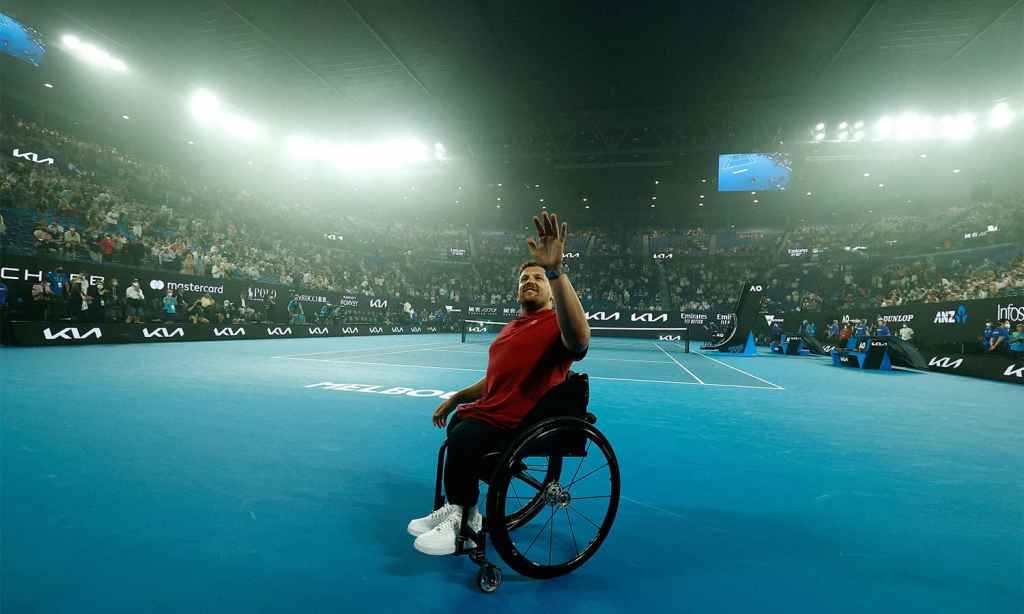The man of the moment, Dylan Alcott, high off the back of an Australian of the Year award, wasted no time in highlighting the issues that people with disabilities face in Aussie society.
“We get less than half the first-round loser ($103,000) that the able-bodied get at all slams,” he said after his fairytale-ending defeat to Sam Schroder in the men’s quad wheelchair final.
The comment speaks to the huge discrepancy in prize money between able-bodied tennis players and those with disabilities. The Australian Open continues to offer the highest prize money of any grand slam to participants and winners, with the singles champions taking home $2.875 million each. By comparison, Schroder will have received less less than 5% of that for a win.
Alcott has hit out at the Open, saying that the difference in prize money is just not good enough.
“I won the lead-in tournament here and it was like $1300,” he said. “How much is a flight from Europe, $3000? It’s not just Australia, it’s all around the world. We don’t get $3.5 million for winning.
“People think we’re lucky to be here — get stuffed. We deserve to be here. We’re selling tickets, sponsors are making money, and people are loving it. So, start thinking like that and then it will all change. That’s what I was lucky enough to do.”
How Much Are The Wheelchair Prizes in the Australian Open?
As Alcott points out, all Grand Slams have far lower prize money for disabled athletes. While the discrepancy between prizes in tennis was equalised between genders over 15 years ago for all slams, the sport still struggles when it comes to equality for its disabled players.
Wimbledon first introduced wheelchair tennis in 2016, offering just £38,000 ($72,000) to the winners. This was actually increased to £46,000 in 2019, however, it is still far below the £1.7 million taken home by able-bodied singles champions.
The Latch has sourced the full breakdown of the wheelchair prizes for the Australian Open from Tennis Australia.
The figures are the same for the men’s, the women’s, and the Quad Wheelchair draws.
For the singles, winners can expect $69,057, while runner-ups get $24,530. Semi-finalists receive $25,895 and quarter-finalists $18,700.
In the doubles, each pair receive $25,895 for a win, $11,510 for a second place finish, and $10,070 for a semi-final place.
The total prize money pool for all wheelchair events is $863,166. By comparison, that total is slightly less than the amount one semi-finalist will receive in the able-bodies singles.
How Bad Is It In Other Sports?
It’s not just tennis that struggles with this issue. A BBC investigation last year revealed that there is almost no prize for para-sports across the globe. In fact, tennis is one of the better ones.
The only para-sports that offer prize money in any global or national events are wheelchair tennis, marathon racing, and para-equestrian.
This isn’t a surprise or a secret to disabled athletes. They enter and compete in these competitions knowing that they won’t be financially compensated. Couple this with the fact that sport is a much more expensive endeavour for people with disabilities and it’s borderline impossible for sports stars to make a living in their discipline alone.
Hannah Cockroft, one of the UK’s most famous Paralympic athletes, has said that she often pays more to enter competitions than she wins at the end.
“People expect that as a Paralympic gold medallist I’m going to be in the same boat as Jess Ennis-Hill and Mo Farah, but I’m not. If you ever expect to come into this and be a millionaire, you’re in the wrong job,” she told the BBC.
Part of the rationale behind offering less prize money to disabled athletes is that the events don’t bring in nearly as much viewership and attention as able-bodied sports do. This was the same argument made in defence of offering women’s sporting events lower prize money and salaries, something that still continues to this day, although not in tennis, at least at the grand slam level.
Hopefully, with Alcott as our 2022 Australian of the year, more attention can be brought to para-sports and that divide further diminishes, resulting in higher rates for para-athletes. Alcott has already done incredible work in building the profile of wheelchair tennis and para-sports in general and we would imagine that he is only going to continue to champion this cause during his tenure. Here’s hoping Australia is ready to listen.
Read more stories from The Latch and subscribe to our email newsletter.







